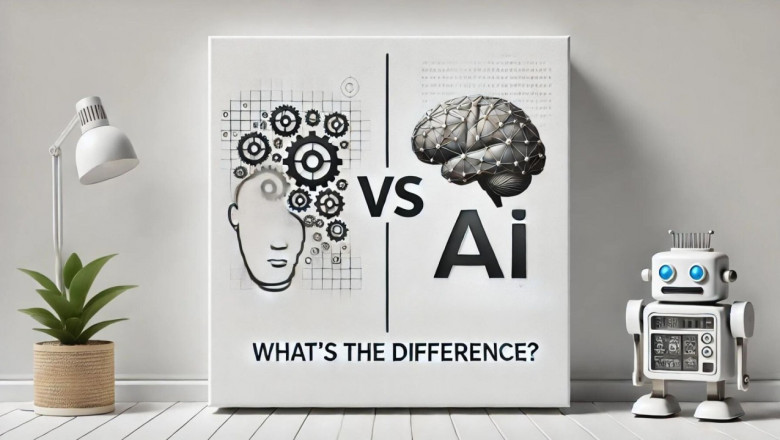views
What is Traditional App Development?
Traditional app development is the conventional approach to building mobile or web applications. It involves:
. Predefined user flows and static interfaces
. Rule-based programming logic
. Human-defined decision-making processes
. Standard coding frameworks like Java, Swift, or Kotlin
This model follows a predictable structure. Developers manually write code to define every function, interaction, and output based on user input. Apps built this way are typically efficient and reliable but limited in how much they can adapt or learn from user behavior. This approach is commonly used in traditional mobile app development, where functionality is pre-programmed rather than dynamically generated.
What is AI App Development?
AI app development, on the other hand, integrates machine learning, natural language processing (NLP), and data analytics into the app’s architecture. This allows the app to:
. Learn from user interactions over time
. Make data-driven decisions without human intervention
. Offer personalized content or recommendations
. Automate tasks using intelligent algorithms
With AI, mobile apps can become proactive, rather than reactive. They can predict user needs, recognize patterns, and offer real-time solutions based on dynamic inputs.
Key Differences Between AI and Traditional App Development
Let’s explore the major distinctions between AI-powered and traditional app development:
1. User Experience (UX)
. Traditional Apps: Provide static experiences that remain the same regardless of user preferences or usage history.
. AI Apps: Deliver personalized, adaptive experiences that evolve based on user behavior, preferences, and interactions.
2. Data Handling
. Traditional Apps: Use data mainly for storage and retrieval.
. AI Apps: Continuously analyze data to improve app functionality and deliver predictive insights.
3. Development Complexity
. Traditional Apps: Easier to plan and build with a fixed roadmap.
. AI Apps: Require more complex planning, data modeling, and ongoing training of algorithms.
4. Scalability & Automation
. Traditional Apps: Scaling typically requires manual intervention and resource allocation.
. AI Apps: Easily scalable due to automation capabilities and cloud-based AI services.
5. Decision Making
. Traditional Apps: Decisions are rule-based and coded by developers.
. AI Apps: Decisions are made by algorithms that evolve based on new data and learning.
6. Maintenance & Updates
. Traditional Apps: Require frequent manual updates.
. AI Apps: Can self-improve over time, reducing the need for constant manual updates.
Use Cases: AI Apps in Action
The real-world impact of AI-powered apps is already visible across industries:
. eCommerce: AI recommends products based on browsing and purchase history.
. Healthcare: AI-powered apps monitor patient vitals and predict potential issues.
. Finance: Apps use AI for fraud detection and credit scoring.
. Transportation: Ride-sharing apps use AI for route optimization and dynamic pricing.
These features are difficult to implement with traditional programming alone, showcasing the transformative power of AI.
When to Choose AI Over Traditional Development
While traditional apps are still useful for simple or static applications, AI is increasingly becoming the go-to for:
. Apps requiring real-time decision making
. Platforms needing personalization and user behavior prediction
. Businesses aiming to automate processes and reduce operational costs
If your app demands smarter engagement, intelligent automation, or continuous improvement, AI is likely the better choice.
Challenges in AI App Development
Despite its benefits, AI app development comes with its own set of challenges:
. High Initial Investment: Requires skilled developers and advanced tools
. Data Privacy Concerns: Handling sensitive user data demands strict compliance
. Complex Testing: Dynamic learning systems are harder to test and debug
Still, the long-term ROI often outweighs these initial hurdles, especially for forward-thinking businesses.
The Future is Intelligent
AI is not just a buzzword. It’s a foundational shift in how mobile apps are built and used. Traditional app development may still serve basic needs, but as user expectations grow and technology advances, AI will become a standard part of mobile app architecture.
Businesses that adopt AI early will benefit from increased customer satisfaction, higher retention rates, and a competitive edge in their industry.
Ready to Build the Future with AI?
If you're looking to create an intelligent, user-centric, and scalable mobile app, partnering with the right AI app development company is crucial.
Apptunix is a leading AI app development company based in Dubai, UAE, specializing in building smart, innovative mobile apps that leverage artificial intelligence to drive performance and user engagement. Whether you need an AI-powered chatbot, personalized recommendation engine, or predictive analytics system, Apptunix can help you turn your vision into reality.
✉️ Contact Apptunix today to start your journey toward AI-powered digital transformation!














Comments
0 comment